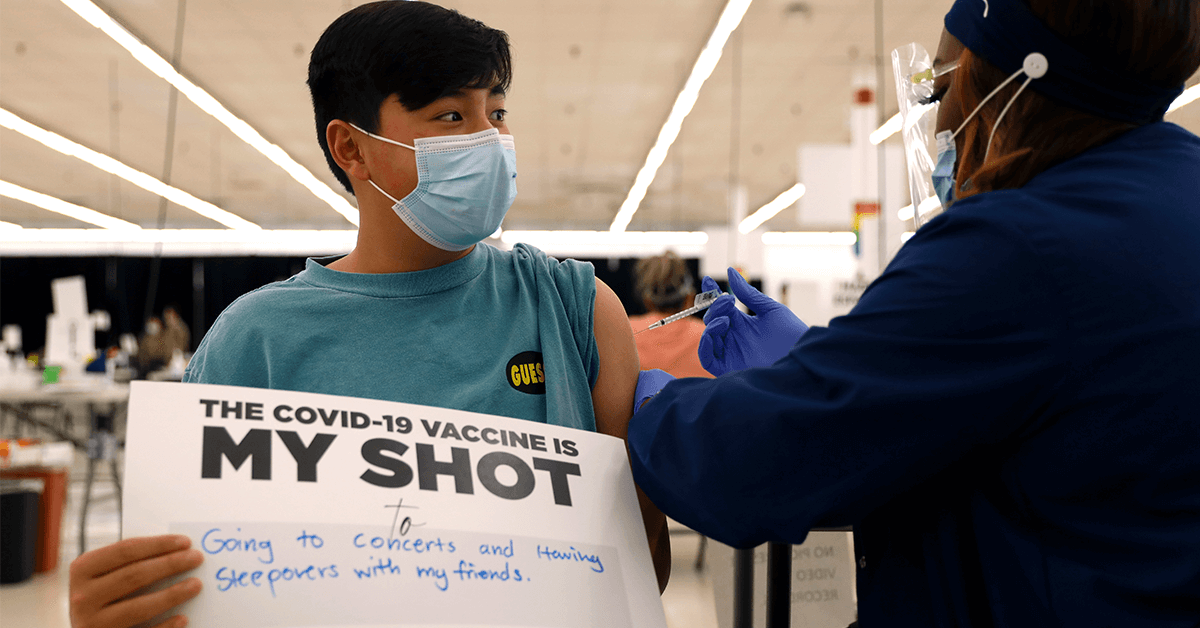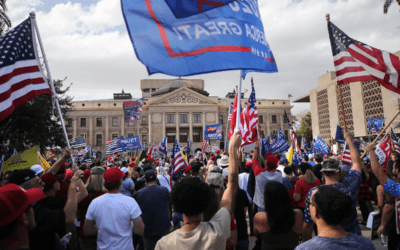
AP Photo/Shafkat Anowar
Arizona will begin administering the vaccine to those 12 and older at all state-run vaccination sites starting Thursday, opening up the vaccine to nearly 400,000 children across the state.
Earlier this week, the US Food and Drug Administration expanded the emergency authorization of the Pfizer-BioNTech COVID-19 vaccine for all those 12 years and older, opening up the vaccine to nearly 400,000 children across the state.
The Pfizer vaccine was previously only approved for those 16 and older.
Arizona will begin administering the vaccine to those 12 and older at all state-run vaccination sites starting Thursday. Appointments are not needed to receive a vaccine at the sites, but parents or guardians must accompany those ages 12 to 15 to the vaccination sites as walk-ins, or schedule an appointment online at podvaccine.azdhs.gov.
Arizona currently operates seven vaccination sites across the state: Gila River Arena in Glendale, Desert Financial Arena in Tempe, Dexcom Regional Distribution Center in Mesa, WestWorld in Scottsdale, University of Arizona in Tucson, Northern Arizona University in Flagstaff, and Yuma Civic Center in Yuma.
Additionally, pharmacies like CVS and other providers who administer the Pfizer vaccine started vaccinating those 12 and older on Thursday. Information about vaccination sites across Arizona can be found at azdhs.gov/FindVaccine.
The Arizona Department of Health Services said it is coordinating with the state’s rural counties—who up until now have only received doses of the Moderna and Johnson & Johnson vaccines—so that 12- to 15-year-olds can be vaccinated in those areas.
ADHS will also host a vaccine event in south Phoenix Thursday for underserved youth, in partnership with the Equality Health Foundation and the HeroZona Foundation.
Children, teenagers, and adults in underserved communities will receive the Pfizer vaccine between 3 and 6 p.m. Thursday at the C.O. Greenfield Elementary School, 7009 S. 10th Street. The second dose of the vaccine will be administered at the same location on June 3.
“Neighborhoods with high Latino and minority populations have had slower vaccination rates as compared to other parts of Arizona,” Rep. Ruben Gallego, a Congressman for Arizona’s 7th Congressional District, said in a statement. “Initiatives like this one aim to combat that and ensure that all families, no matter what neighborhood they reside in, receive fair access to this life-saving immunization.”
As of Thursday, nearly 43% of the state’s population had received at least one dose of the vaccine.
Here’s what to know about how the Pfizer vaccine works in adolescents, and what to expect.
Is the vaccine safe for my 12 year old?
The vaccine is considered very safe for the vast majority of people, producing only mild side effects.
Dr. Michael Smith, a pediatrician and the medical director of the Duke Children’s Health Center Infectious Diseases Clinic in Durham, helped conduct the Pfizer trials in this age group. The data, he said, shows the vaccine to be as safe in adolescents as it is in adults, and could even be more effective.
“The most common things that we are seeing were not surprising to anybody – it hurts; it can be a little bit red; your injection site can be a little bit swollen,” Smith said in a Zoom conference call with reporters on Tuesday. Headaches and low-grade fevers can also occur.
Smith said some of the common side effects associated with the vaccine can be a little worse in this age range because children’s immune systems are younger and stronger.
But a strong immune response to the vaccine is simply a sign that it’s working.
“I have no doubt in my mind that this is a good idea, if you have a 12- to 15-year-old at home, to give them the vaccine,” Smith said. “At this point there is no reason not to.”
How effective will the vaccine be for adolescents?
Very effective.
“The important thing to note is that of the children in the trial who ultimately had a COVID infection, all of them were in the placebo group, and none were in the vaccine group,” Dr. Smith said. “So if you got the vaccine in this trial, you did not get COVID. That translates to a vaccine that has 100 percent efficacy.”
It’s a big exciting number—100% protection.
But, as with all vaccines there is no such thing as true 100% protection. Once the pool is expanded, there are sure to be some children who contract the virus after getting the vaccine. This has happened in every vaccine ever made. But, just like with vaccinated adults, any vaccinated child who gets COVID will still have profound protection against the worst effects of the disease. Data on the vaccines in adults show far lower rates of hospitalizations and virtually no deaths.
Will children need a booster?
It’s too early to tell, though it is likely that emerging variants of the virus will indeed mean that we’ll need updates. Moderna is already working on a booster for some variants, and the best news so far is that all vaccines show at least some protection against the existing variants of concern.
“My best guess is, yes, we probably will need boosters,” Smith said.
But the logistics of such an undertaking won’t be cumbersome. The Pfizer and Moderna vaccines use what is called messenger RNA to train your immune system to spot the coronavirus’s unique spike proteins. Most of the mutations in the virus occur in this spike protein, which it uses to invade your cells, and mRNA vaccines act like spies and fight trainers all at once. The vaccine gives your immune system the intel on the spike protein and shows it how to immediately recognize the intruder and kill it. When the virus mutates in its spike protein, however, the difference can be enough to elude the body’s vaccine-trained defenses.
Boosters would be tuned directly to the specific proteins of whatever variants are most troublesome and it would be relatively easy to plug in the new data and make new vaccines. “The technology is there”, Smith said, and the process should be relatively seamless.
So … should I get my child vaccinated?
Yes, Smith said.
“Let’s be clear,” Smith said, “kids are affected by this.”
Vaccines will help children restore what was lost, he said.
“I think all of us – whether we are parents or grandparents or physicians – can clearly see the impact that this pandemic has had on kids. And anything we can do to reduce disease incidence and disease transmission in kids, to get society back open to the way it was pre-pandemic, I think is useful.”

He said what? 10 things to know about RFK Jr.
The Kennedy family has long been considered “Democratic royalty.” But Robert F. Kennedy, Jr.—son of Robert F. Kennedy, who was assassinated while...

Here’s everything you need to know about this month’s Mercury retrograde
Does everything in your life feel a little more chaotic than usual? Or do you feel like misunderstandings are cropping up more frequently than they...

Arizona expects to be back at the center of election attacks. Its officials are going on offense
Republican Richer and Democrat Fontes are taking more aggressive steps than ever to rebuild trust with voters, knock down disinformation, and...

George Santos’ former treasurer running attack ads in Arizona with Dem-sounding PAC name
An unregistered, Republican-run political action committee from Texas with a deceptively Democratic name and ties to disgraced US Rep. George Santos...




